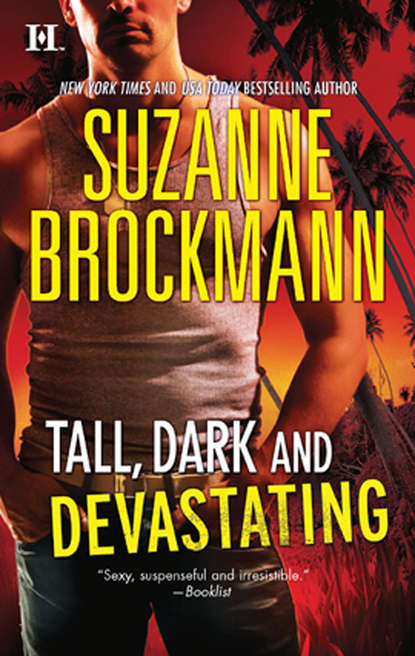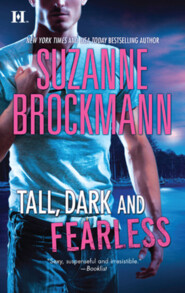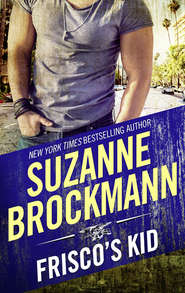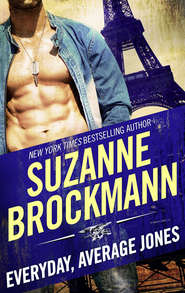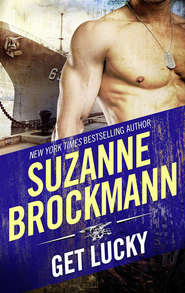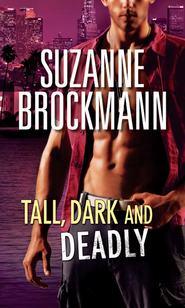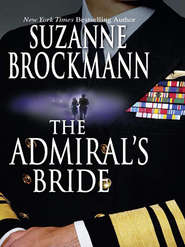По всем вопросам обращайтесь на: info@litportal.ru
(©) 2003-2025.
✖
Tall, Dark and Devastating: Harvard's Education
Автор
Год написания книги
2019
Настройки чтения
Размер шрифта
Высота строк
Поля
She could feel Harvard watching as she pushed herself unsteadily to her feet. He moved closer, still looking to catch her if she fell. It was remarkable, really. Every other woman she knew would’ve been dying for a good-looking man like Senior Chief Daryl Becker to play hero for them.
But she wasn’t every other woman.
She’d come this far on her own two feet and she wasn’t about to let some silly bump on the head undermine her tough-as-nails reputation.
It was hard enough working at FInCOM, where the boys only grudgingly let the girls play, too. But for eight weeks, she was being allowed access to the absolutely-no-women-allowed world of the U.S. Navy SEALs.
For the next eight weeks, the members of SEAL Team Ten’s invincible Alpha Squad were going to be watching her, waiting for her to screw up so they could say to each other, See, this is precisely why we don’t let women in.
The SEALs were the U.S. Navy’s special operations units. They were highly trained warriors with well-earned reputations for being the closest things to superheroes this side of a comic book.
The acronym came from sea, air and land, and SEALs were equally comfortable—and adept—at operating in all of those environments.
They were smart, they were brave and they were more than a little crazy—they had to be to make it through the grueling sessions known as BUD/S training, which included the legendary Hell Week. From what P.J. had heard, a man who was still in the SEAL program after completing Hell Week had every right to be cocky and arrogant.
And the men of Alpha Squad at times could be both.
As P.J. forced herself to walk slowly but steadily away, she could feel all of Alpha Squad’s eyes on her back.
Especially Senior Chief Harvard Becker’s.
CHAPTER TWO
HARVARD DIDN’T KNOW what the hell he was doing here.
It was nearly 0100. He should have gone back to his apartment outside the base. He should be sitting on his couch in his boxers, chillin’ and having a cold beer and skimming through the past five days’ videotapes of The Young and the Restless instead of making a soap opera out of his own life.
Instead, he was here in this allegedly upscale hotel bar with the rest of the unmarried guys from Alpha Squad, making a sorry-assed attempt to bond with FInCOM’s wunderkinder.
Steel guitars were wailing from the jukebox—some dreadful song about Papa going after Mama and doing her in because of her cheatin’ heart. And the SEALs—Wes and Bobby were the only ones Harvard could see from his quick scan of the late-night crowd—were sitting on one side of the room, and the three male FInCOM agents were on the other. Not much bonding going down here tonight.
Harvard didn’t blame Wes and Bob one bit. FInCOM’s fab four didn’t have much in common with the Alpha Squad.
It was amazing, really. There were something like seventy-three-hundred agents in the Federal Intelligence Commission. He’d have thought the Chosen Four would have come equipped with superhero capes and a giant S emblazoned on the fronts of their shirts at the very least.
Timothy Farber was FInCOM’s alleged golden boy. He was a fresh-faced, college-boy type, several years shy of thirty, with a humorless earnestness that was annoying as hell. He was a solid subscriber to the FInCOM my-way-or-the-highway way of thinking. This no doubt worked when directing traffic to allow clear passage for the President’s convoy, but it wouldn’t do him quite as well when dealing with unpredictable, suicidal, religious zealots.
No, in Harvard’s experience, a leader of a counterterrorist team needed constantly to adjust his plan of attack, altering and revising as unknown variables become known. A team leader needed to know how to listen to others’ opinions and to know that sometimes the other guy’s idea might be the best idea.
Joe Cat had consulted with Alan “Frisco” Francisco—one of the best BUD/S training instructors in Coronado—and had purposely put blustery Tim Farber in command of the very first training scenario in an attempt to knock him off his high horse. A former member of the Alpha Squad who was off the active duty list because of a permanent injury to his knee, Frisco had duties that kept him in California, but he was in constant contact with both Alpha Squad’s captain and Harvard.
Still, judging from the way Farber was holding court at the bar, surrounded by his two fellow agents, it was obvious to Harvard that Frisco’s ploy hadn’t worked. Farber was totally unperturbed by his failure.
Maybe tomorrow, when Alpha Squad reviewed the exercise, the fact would finally sink in that Farber had personally created this snafu, this grand-scale Charlie Foxtrot.
But somehow Harvard doubted it.
As Harvard watched, Farber drew something on a napkin, and the two other FInCOM agents nodded seriously.
Greg Greene and Charles Schneider were around Harvard’s age, thirty-five, thirty-six, maybe even older. They’d spent most of the preliminary classroom sessions looking bored, their body language broadcasting “been there, done that.” But in the field, during the evening’s exercise, they’d shown little imagination. They were standard issue FInCOM agents—finks, as the SEALs were fond of calling them. They didn’t make waves, they followed the rule book to the last letter, they waited for someone else to take the lead and they looked good in dark suits and sunglasses.
They’d looked good smeared with yellow paint from the terrorists’ weapons, too. They’d followed Tim Farber’s command without question, and in the mock ambush that had resulted, they’d been rather messily mock killed.
Still, they hadn’t seemed to learn that following Farber unquestioningly might’ve been a mistake, because here they were, following Farber still. No doubt because someone higher up in FInCOM had told them to follow him.
Only one of the four superfinks out there tonight had openly questioned Farber’s command decisions.
P. J. Richards.
Harvard glanced around the bar again, but he didn’t see her anywhere. She was probably in her room, having a soak in the tub, icing the bruise on the back of her head.
Damn, he could still see her, flung backward like some rag doll when that paint ball hit her. He hadn’t gone to church in a long time, but he’d silently checked in with God as he’d called for the training session to halt, asking for divine intervention, praying that P.J. hadn’t hit that tree with enough force to break her pretty neck.
Men died during training. The risk was part of being a SEAL. But P. J. Richards was neither man nor SEAL, and the thought of her out there with them, facing the dangers they so casually faced, made Harvard’s skin crawl.
“Hey, Senior Chief. I didn’t expect to see you here.” Lucky O’Donlon was carrying a pitcher of beer from the bar.
“I didn’t expect to see you here, either, O’Donlon. I was sure you’d be heading out to see that girlfriend of yours at warp speed.”
Harvard followed Lucky to the table where Bobby and Wes were sitting. He nodded a greeting to them—the inseparable twins of Alpha Squad. Unidentical twins. Bobby Taylor came close to Harvard’s six foot five, and he gave the impression of being nearly as wide around as he was tall. If he hadn’t wanted to become a SEAL, he would have had a serious future as a professional football linebacker. And Wes Skelly was Alpha Squad’s version of Popeye the sailor man, short and wiry and liberally tattooed. What he lacked in height and weight, he more than made up for with his extremely big mouth.
“Renee had a meeting tonight for the state pageant.” Lucky sat down at the table and then kicked out a chair for Harvard to join them. He filled first Bobby’s mug from the pitcher, then poured some beer for Wes. “You want me to get you a glass?” he asked Harvard.
“No, thanks.” Harvard shook his head as he sat down. “What’s that title Renee just won? Miss Virginia Beach?”
“Miss East Coast Virginia,” Lucky told him.
“Pretty girl. Young girl.”
Lucky flashed his movie-star-perfect grin as if the fact that his girlfriend probably hadn’t yet celebrated her nineteenth birthday was something to be proud of. “Don’t I know it.”
Harvard had to smile. To each his own. Personally, he liked women with a little more life experience.
“Hey, Crash,” Wes called in his megaphone voice. “Pull up a chair.”
William Hawken, Alpha Squad’s newest temporary member, sat across from Harvard, meeting his eyes and nodding briefly. Hawken was one spooky individual, dark and almost unnaturally quiet, seemingly capable of becoming invisible upon demand. At first glance, he was not particularly tall, not particularly well-built, not particularly handsome.
But Harvard knew better than to go by a first glance. The man had been nicknamed Crash for his ability to move soundlessly in any circumstance, under any condition. Crash was anything but average. On closer examination, his eyes were a steely shade of blue with a sharpness to them that seemed almost to cut. Crash didn’t so much look around a room—he absorbed it, memorized it, recorded it, probably permanently. And beneath his purposely loose-fitting clothes, his body was that of a long-distance runner—lean and muscular, without an extra ounce of fat anywhere.
“Grab a glass and have a beer,” Lucky told Crash.
He shook his head. “No, thanks,” he said in his deceptively quiet voice. “Beer’s not my drink. I’ll wait for the waitress.”
Harvard knew that Crash was part of this FInCOM project at Captain Catalanotto’s special request. He was in charge of organizing all the “terrorist” activities the Combined SEAL/FInCOM team would be running into over the next eight weeks. He’d been the strategical force behind tonight’s paint-ball slaughter. The score so far was Crash—one, CSF team—zero.
Harvard didn’t know him very well, but Hawken’s reputation was close to legendary. He’d been part of the SEALs’ mysterious Gray Group for years. And apparently he’d been involved in countless black operations—highly covert, hush-hush missions that were as controversial as they were dangerous. SEALs were allegedly sent into other countries to perform tasks that even the U.S. Government claimed to know nothing about—neutralization of drug lords, permanent removal of political and military leaders preaching genocide and so on. The SEALs were forced to play God, or at least take on the roles of judge, jury and hangman combined. It was not a job Harvard would have relished doing.
If the SEALs on a black op succeeded at their mission, they’d get little or no recognition. And if they failed, they were on their own, possibly facing espionage charges, with no chance of the government stepping forward and accepting the responsibility.





